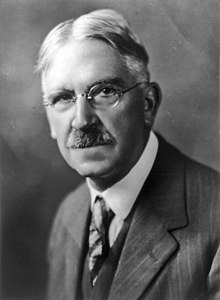John Dewey
John Dewey (/ˈduːi/; October 20, 1859 – Juin 1, 1952) wis an American philosopher, psychologist, an eddicational reformer whase ideas hae been influential in eddication an social reform. Dewey is ane o the primary figurs associatit wi the philosophy o pragmatism an is conseedert ane o the foonders o functional psychology. A Review of General Psychology survey, published in 2002, ranked Dewey as the 93rd maist citit psychologist o the 20t century.[2] A well-kent public intellectual, he wis a major vyce o progressive eddication an liberalism anaa.[3][4] Awtho Dewey is kent best for his furthsettins anent education, he wrate aboot sindry ither topics anaa, includin epistemology, metapheesics, aesthetics, airt, logic, social theory, an ethics.
John Dewey | |
|---|---|
 | |
| Born | 20 October 1859 Burlington, Vermont, Unitit States |
| Dee'd | 1 Juin 1952 (aged 92) New York Ceety, New York, Unitit States |
| Alma mater | Varsity o Vermont Johns Hopkins Varsity |
| Era | 20t-century philosophy |
| Schuil | Pragmatism |
| Institutions | Varsity o Michigan Varsity o Chicago Varsity o Chicago Laboratory Schuils Columbia Varsity |
Main interests | Philosophy o eddication, epistemology, jurnalism, ethics |
Notable ideas | Reflective thinkin[1] American Association of University Professors Immediate empiricism Inquiry intae Moscow shaw trials aboot Trotsky Eddicational progressivism |
References
eedit- ↑ John Dewey, How we think (1910), p. 9.
- ↑ Haggbloom, Steven J.; et al. (2002). "The 100 most eminent psychologists of the 20th century". Review of General Psychology. 6 (2): 139–152. doi:10.1037/1089-2680.6.2.139. S2CID 145668721.
- ↑ Alan Ryan, John Dewey and the High Tide of American Liberalism, (1995), p. 32
- ↑ Violas, Paul C.; Tozer, Steven; Senese, Guy B. School and Society: Historical and Contemporary Perspectives. McGraw-Hill Humanities/Social Sciences/Languages. p. 121. ISBN 0-07-298556-9.